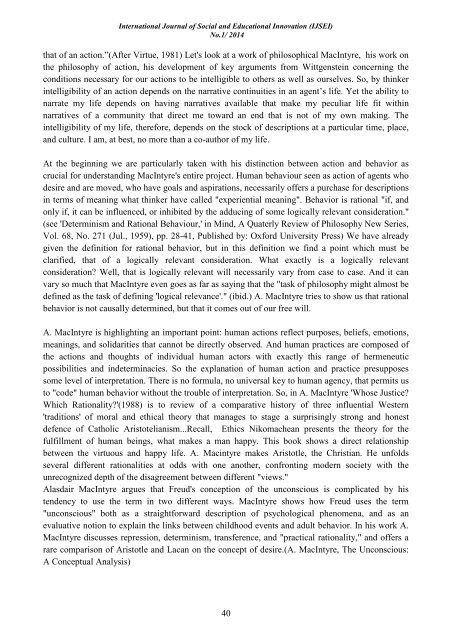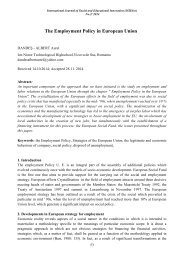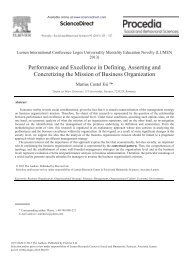International Journal of Social and Educational Innovation (IJSEI)
International Journal of Social and Educational Innovation (IJSEI) publishes research paper in the field of: Social Science and Humanities, Education, Psychology, Philosophy, Logics, Ontology and Philosophy of Science, Political Science, History, Sociology, Business and Marketing, Economics, Financial Development, Accounting, Banking, Management, Human Resources, Law, Public Administration Environmental Studies, Climate Change, Educational Technology, Language and Linguistics and so on. All papers which will be sent for evaluation/ publishing must contain educational approaches.
International Journal of Social and Educational Innovation (IJSEI) publishes research paper in the field of: Social Science and Humanities, Education, Psychology, Philosophy, Logics, Ontology and Philosophy of Science, Political Science, History, Sociology, Business and Marketing, Economics, Financial Development, Accounting, Banking, Management, Human Resources, Law, Public Administration Environmental Studies, Climate Change, Educational Technology, Language and Linguistics and so on.
All papers which will be sent for evaluation/ publishing must contain educational approaches.
You also want an ePaper? Increase the reach of your titles
YUMPU automatically turns print PDFs into web optimized ePapers that Google loves.
<strong>International</strong> <strong>Journal</strong> <strong>of</strong> <strong>Social</strong> <strong>and</strong> <strong>Educational</strong> <strong>Innovation</strong> (<strong>IJSEI</strong>)<br />
No.1/ 2014<br />
that <strong>of</strong> an action.‖(After Virtue, 1981) Let's look at a work <strong>of</strong> philosophical MacIntyre, his work on<br />
the philosophy <strong>of</strong> action, his development <strong>of</strong> key arguments from Wittgenstein concerning the<br />
conditions necessary for our actions to be intelligible to others as well as ourselves. So, by thinker<br />
intelligibility <strong>of</strong> an action depends on the narrative continuities in an agent‘s life. Yet the ability to<br />
narrate my life depends on having narratives available that make my peculiar life fit within<br />
narratives <strong>of</strong> a community that direct me toward an end that is not <strong>of</strong> my own making. The<br />
intelligibility <strong>of</strong> my life, therefore, depends on the stock <strong>of</strong> descriptions at a particular time, place,<br />
<strong>and</strong> culture. I am, at best, no more than a co-author <strong>of</strong> my life.<br />
At the beginning we are particularly taken with his distinction between action <strong>and</strong> behavior as<br />
crucial for underst<strong>and</strong>ing MacIntyre's entire project. Human behaviour seen as action <strong>of</strong> agents who<br />
desire <strong>and</strong> are moved, who have goals <strong>and</strong> aspirations, necessarily <strong>of</strong>fers a purchase for descriptions<br />
in terms <strong>of</strong> meaning what thinker have called "experiential meaning". Behavior is rational "if, <strong>and</strong><br />
only if, it can be influenced, or inhibited by the adducing <strong>of</strong> some logically relevant consideration."<br />
(see 'Determinism <strong>and</strong> Rational Behaviour,' in Mind, A Quaterly Review <strong>of</strong> Philosophy New Series,<br />
Vol. 68, No. 271 (Jul., 1959), pp. 28-41, Published by: Oxford University Press) We have already<br />
given the definition for rational behavior, but in this definition we find a point which must be<br />
clarified, that <strong>of</strong> a logically relevant consideration. What exactly is a logically relevant<br />
consideration? Well, that is logically relevant will necessarily vary from case to case. And it can<br />
vary so much that MacIntyre even goes as far as saying that the "task <strong>of</strong> philosophy might almost be<br />
defined as the task <strong>of</strong> defining 'logical relevance'." (ibid.) A. MacIntyre tries to show us that rational<br />
behavior is not causally determined, but that it comes out <strong>of</strong> our free will.<br />
A. MacIntyre is highlighting an important point: human actions reflect purposes, beliefs, emotions,<br />
meanings, <strong>and</strong> solidarities that cannot be directly observed. And human practices are composed <strong>of</strong><br />
the actions <strong>and</strong> thoughts <strong>of</strong> individual human actors with exactly this range <strong>of</strong> hermeneutic<br />
possibilities <strong>and</strong> indeterminacies. So the explanation <strong>of</strong> human action <strong>and</strong> practice presupposes<br />
some level <strong>of</strong> interpretation. There is no formula, no universal key to human agency, that permits us<br />
to "code" human behavior without the trouble <strong>of</strong> interpretation. So, in A. MacIntyre 'Whose Justice?<br />
Which Rationality?'(1988) is to review <strong>of</strong> a comparative history <strong>of</strong> three influential Western<br />
'traditions' <strong>of</strong> moral <strong>and</strong> ethical theory that manages to stage a surprisingly strong <strong>and</strong> honest<br />
defence <strong>of</strong> Catholic Aristotelianism...Recall, Ethics Nikomachean presents the theory for the<br />
fulfillment <strong>of</strong> human beings, what makes a man happy. This book shows a direct relationship<br />
between the virtuous <strong>and</strong> happy life. A. Macintyre makes Aristotle, the Christian. He unfolds<br />
several different rationalities at odds with one another, confronting modern society with the<br />
unrecognized depth <strong>of</strong> the disagreement between different "views."<br />
Alasdair MacIntyre argues that Freud's conception <strong>of</strong> the unconscious is complicated by his<br />
tendency to use the term in two different ways. MacIntyre shows how Freud uses the term<br />
"unconscious" both as a straightforward description <strong>of</strong> psychological phenomena, <strong>and</strong> as an<br />
evaluative notion to explain the links between childhood events <strong>and</strong> adult behavior. In his work A.<br />
MacIntyre discusses repression, determinism, transference, <strong>and</strong> "practical rationality," <strong>and</strong> <strong>of</strong>fers a<br />
rare comparison <strong>of</strong> Aristotle <strong>and</strong> Lacan on the concept <strong>of</strong> desire.(A. MacIntyre, The Unconscious:<br />
A Conceptual Analysis)<br />
40





